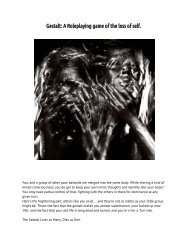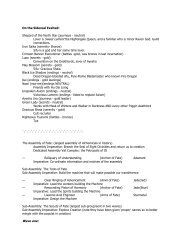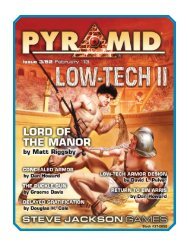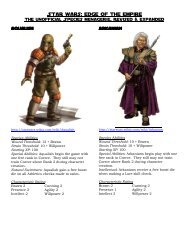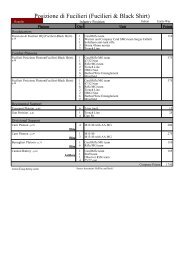- Page 1 and 2: 13 th Age A fantasy roleplaying gam
- Page 3 and 4: 9 th Level Songs & Spells .........
- Page 5 and 6: MINOTAUR ..........................
- Page 7 and 8: INTRODUCTION STARTING 13 TH AGE We
- Page 9 and 10: 4E took the game forward in terms o
- Page 11 and 12: feats: Characters gain one each lev
- Page 13 and 14: power: Powers are things a characte
- Page 15 and 16: Chapter 1: ICONS Most d20 games h
- Page 17 and 18: ARCHMAGE The Archmage has preserve
- Page 19 and 20: CRUSADER The Crusader is the armore
- Page 21 and 22: The True Danger Everything will be
- Page 23 and 24: ELF QUEEN The Elf Queen rules the C
- Page 25 and 26: GREAT GOLD WYRM The Great Gold Wyrm
- Page 27 and 28: LICH KING The Lich King is the lord
- Page 29 and 30: PRIESTESS The Priestess hears all t
- Page 31 and 32: THE THREE The Three were among the
- Page 33: Chapter 2: Character Rules CHARACTE
- Page 37 and 38: “I sneaked into the Priestess’s
- Page 39 and 40: Players Creating the Story The worl
- Page 41 and 42: I am the only elf/dwarf/person in t
- Page 43 and 44: Relationship Points At 1 st level,
- Page 45 and 46: Conflicted Relationship with Villai
- Page 47 and 48: implementations of that experience
- Page 49 and 50: for the character who has mastered
- Page 51 and 52: they fall to the bottom in a hail o
- Page 53 and 54: or emotions. But if it’s importan
- Page 55 and 56: Barbarian Rage Class E: Now start r
- Page 57 and 58: Domain: Healing Talent A: Allies yo
- Page 59 and 60: Defensive Fighting Maneuver C: Bonu
- Page 61 and 62: against you with a melee attack. 2-
- Page 63 and 64: Metallic Heritage Talent A: Gain re
- Page 65 and 66: In 13th Age, we cut to the chase an
- Page 67 and 68: General Goods Item Price Standard t
- Page 69 and 70: Fine for impeding Imperial officia
- Page 71 and 72: Chapter 3: Races Our art doesn’t
- Page 73 and 74: Lethal (Racial Power) Once per batt
- Page 75 and 76: What elves know: The perfect elven
- Page 77 and 78: and that the earliest halflings liv
- Page 79 and 80: aren’t just game mechanics and da
- Page 81 and 82: over and over—when a spell starts
- Page 83 and 84: BARBARIAN Striding out of the wilde
- Page 85 and 86:
Barbarian 1 st Level Stats Level mo
- Page 87 and 88:
Adventurer Feat: Add one recovery t
- Page 89 and 90:
BARD If the gods didn’t create th
- Page 91 and 92:
Bard Melee Weapons One-Handed Two-H
- Page 93 and 94:
Bard 1 st Level Stats Level modifie
- Page 95 and 96:
Throat-Destroying Tribute to the Or
- Page 97 and 98:
We expect you to name each of your
- Page 99 and 100:
Obviously you’ll be rephrasing it
- Page 101 and 102:
The Overworld Two-Step Close-quarte
- Page 103 and 104:
The gods may have walked the world
- Page 105 and 106:
Cleric 1 st Level Stats Level modif
- Page 107 and 108:
can let them use one of your recove
- Page 109 and 110:
Champion Feat: Your trick die can b
- Page 111 and 112:
Hit by 8+: Holy damage equal to hal
- Page 113 and 114:
Effect: Choose a defense: AC, PD, o
- Page 115 and 116:
FIGHTER The grit and guts it takes
- Page 117 and 118:
Fighter Level Progression Fighter w
- Page 119 and 120:
Fighter Class Features Fighters hav
- Page 121 and 122:
Deadly Assault Flexible melee or ra
- Page 123 and 124:
Spinning Charge Flexible melee atta
- Page 125 and 126:
your paladin isn’t wearing much a
- Page 127 and 128:
Paladin 1 st Level Stats Level modi
- Page 129 and 130:
means that you will not take the on
- Page 131 and 132:
RANGER Some rangers get their train
- Page 133 and 134:
10 mod) x 24 3 champion 3 epic abil
- Page 135 and 136:
Ranger Class Talents Choose three r
- Page 137 and 138:
Tracker You have the Tracker backgr
- Page 139 and 140:
Champion Feat: The ongoing damage i
- Page 141 and 142:
ROGUE Rogues are a mixed bag. Some
- Page 143 and 144:
Rogue Melee Weapons One-Handed Two-
- Page 145 and 146:
Rogue Class Features All rogues fig
- Page 147 and 148:
of onrushing orcs, or cutting open
- Page 149 and 150:
it, and then use a quick action to
- Page 151 and 152:
allies, but you see through it and
- Page 153 and 154:
Sorcerer Weapons Lacking any specia
- Page 155 and 156:
Sorcerer 1 st Level Stats Level mod
- Page 157 and 158:
Gather power: When a sorcerer gathe
- Page 159 and 160:
elationship points but you can’t
- Page 161 and 162:
Breath of the White Dragon Close-qu
- Page 163 and 164:
Target: You; breath weapon Effect:
- Page 165 and 166:
to make recharge rolls for your exp
- Page 167 and 168:
WIZARD Wizards are the masters of a
- Page 169 and 170:
Wizard Level Progression Wizard Lev
- Page 171 and 172:
Wizard Class Features Wizards have
- Page 173 and 174:
Unlike normal wizards, who use a st
- Page 175 and 176:
Free action to cast Trigger: You ca
- Page 177 and 178:
5 th level spell You can now target
- Page 179 and 180:
Players Yes, if someone is scrying
- Page 181 and 182:
9 th level spell 4d6 damage. Advent
- Page 183 and 184:
9 th level spell 10d10 damage. Cham
- Page 185 and 186:
Target: One nearby enemy Attack: In
- Page 187 and 188:
portion of damage increases based o
- Page 189 and 190:
stack with each other. The exceptio
- Page 191 and 192:
Actions On your turn, you can take
- Page 193 and 194:
standard action either to move, tak
- Page 195 and 196:
hasty and successful retreat, carry
- Page 197 and 198:
Most fighter attacks are flexible a
- Page 199 and 200:
Make death saves while down: At the
- Page 201 and 202:
COMBAT MODIFIERS In general, if you
- Page 203 and 204:
words, when you attack a creature g
- Page 205 and 206:
weapons. And magic daggers? They’
- Page 207 and 208:
aises his eyebrows archly while Wes
- Page 209 and 210:
Chapter 6: Running the Game This ch
- Page 211 and 212:
Icon Relations Story-Guide Results
- Page 213 and 214:
the character’s agenda but doesn
- Page 215 and 216:
might be delayed, and it might be n
- Page 217 and 218:
scythe traps were expected to kill
- Page 219 and 220:
counts as half a monster of the PC
- Page 221 and 222:
on a “per day” basis. If you’
- Page 223 and 224:
Transcendent Moments Moments that s
- Page 225 and 226:
GP Per Full Heal-Up 1 st Level PCs:
- Page 227 and 228:
mighty magic than it would first ap
- Page 229 and 230:
Visitors from Other Worlds It’s a
- Page 231 and 232:
Chapter 7: Monsters The monsters in
- Page 233 and 234:
Failure indicates that the creature
- Page 235 and 236:
Monster Roles Dividing monsters int
- Page 237 and 238:
Monster Equivalents Monster Level c
- Page 239 and 240:
dragon 5 sahuagin normal wrecker 5
- Page 241 and 242:
Limited use: 2/round, each requirin
- Page 243 and 244:
ANKHEG Ankhegs love to burrow into
- Page 245 and 246:
CHIMERA In illustrated bestiaries c
- Page 247 and 248:
Imp Imps are batwinged balls of cha
- Page 249 and 250:
penalty unless the creature hit the
- Page 251 and 252:
[Special trigger] Abyssal curse +15
- Page 253 and 254:
DERRO Derro are dwarves who have mi
- Page 255 and 256:
7: Now I’m mad!—The first time
- Page 257 and 258:
[Special trigger] Bite +9 vs. AC—
- Page 259 and 260:
[Special trigger] C: Poison breath
- Page 261 and 262:
C: Far slashing lightning breath +1
- Page 263 and 264:
GARGOYLE Gargoyles are either mons
- Page 265 and 266:
GIANT Giants are the original peopl
- Page 267 and 268:
Fire Giant Warlord You know what’
- Page 269 and 270:
GNOLL According to some, gnolls rul
- Page 271 and 272:
Icons PD 17 HP 55 MD 12 Bugbears co
- Page 273 and 274:
GOLEM Golems’ occasional spontane
- Page 275 and 276:
Poison gas: The first time the iron
- Page 277 and 278:
HARPY The harpies sing pieces and s
- Page 279 and 280:
HUMAN Humans are the nicest and bes
- Page 281 and 282:
HYDRA Hydras instinctively split th
- Page 283 and 284:
KOBOLD Kobolds are the shameful spa
- Page 285 and 286:
MEDUSA These snake-haired, reptilia
- Page 287 and 288:
MINOTAUR Minotaurs are unholy monst
- Page 289 and 290:
OOZE Evil masterminds, spellcasters
- Page 291 and 292:
ORC Not all orcs are born. Some spr
- Page 293 and 294:
OTYUGH When the trash-heap pushes o
- Page 295 and 296:
PHASE SPIDER Phase spiders reported
- Page 297 and 298:
RAKSHASA Rakshasas blend savagery a
- Page 299 and 300:
SKELETON The most dangerous skeleto
- Page 301 and 302:
TROGLODYTE The stories say that tro
- Page 303 and 304:
VAMPIRE There are basically two sor
- Page 305 and 306:
WRAITH Some wraiths recall their fo
- Page 307 and 308:
ZOMBIE Near the end of a past age,
- Page 309 and 310:
dragon and the ettin. Or use condit
- Page 311 and 312:
Baseline Stats for Normal Monsters
- Page 313 and 314:
Chapter 8: The Dragon Empire This c
- Page 315 and 316:
allowed powerful fiends to tear thr
- Page 317 and 318:
passageways that lead to the overwo
- Page 319 and 320:
compunction about eliminating some
- Page 321 and 322:
garrisoning his fortresses. The pre
- Page 323 and 324:
inhabitants have a soul of their ow
- Page 325 and 326:
towns often sprout up where newcome
- Page 327 and 328:
people (if any) who live on its bac
- Page 329 and 330:
have learned that the great island
- Page 331 and 332:
the Midland Sea, including the road
- Page 333 and 334:
going on, because pride couldn’t
- Page 335 and 336:
your potion will blow through your
- Page 337 and 338:
longer running the show; instead, t
- Page 339 and 340:
a way to help the beloved (or simpl
- Page 341 and 342:
Tome of the Divinities and their De
- Page 343 and 344:
Necklaces, Pendants Default bonus:
- Page 345 and 346:
Default bonus: Attack and damage wi
- Page 347 and 348:
items, lore bottles can often be fo
- Page 349 and 350:
Chapter 10: Blood & Lightning This
- Page 351 and 352:
icon may have loaned the PC an adve
- Page 353 and 354:
Shifty bugger: Goblins only need to
- Page 355 and 356:
place to hide and prepare for the a
- Page 357 and 358:
achieves monstrous levels of power,
- Page 359 and 360:
of PCs Magician Savage 3 1 2 1 4 1
- Page 361 and 362:
OPEN GAME LICENSE Version 1.0a The



